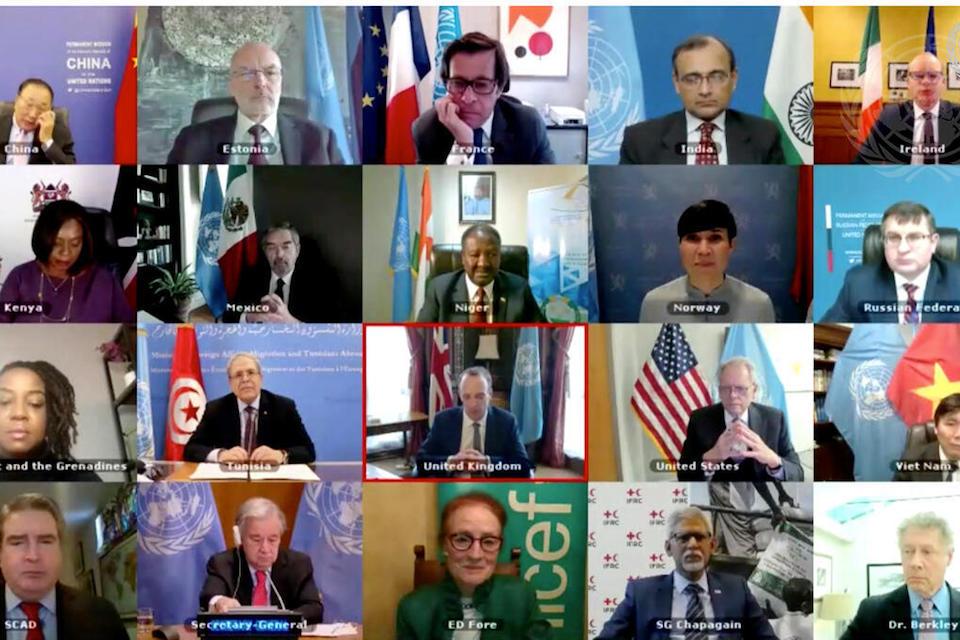Ensuring equitable access to COVID-19 vaccines in contexts affected by conflict and insecurity
At the UN Security Council, the Foreign Secretary proposed a new Resolution on temporary ceasefires and coordinated effort for COVID-19 vaccine distribution.

- UK proposes new Security Council Resolution for temporary ceasefires and co-ordinated action on equitable access to vaccines
- UK urges coordinated effort to enable vaccine distribution and for the protection of humanitarian and health workers
- read the related press release: UK calls for ceasefires to vaccinate people against COVID-19
Your Excellencies, I am very pleased and honoured to address this first ever Security Council meeting on vaccinations.
It is I think right that we bring the full weight of the Security Council and wider UN system to bear on ending this appalling pandemic.
The virus is still on the rise globally, with the emergence of new, more transmissible variants, which has itself driven increased transmission in most regions, I think it’s fair to say. But, with vaccines approved and being rolled out, we now have that opportunity to fight back.
At last, we can genuinely say that we see the light at the end of the tunnel, or at least a light that is drawing closer to us. But this has to be a global effort.
The pandemic isn’t under control anywhere until it’s under control everywhere. And we need to think of ourselves as a team working together against a common and very deadly enemy.
That is the reality of our struggle. No nation is truly safe until we are all safe.
In terms of what that means for us, I think it means have to work to secure access to vaccines around the world, including in the hardest to reach places, including places of conflict and other types of insecurity.
And at present, we know that more than 160 million people worldwide are at risk of being excluded from vaccinations because of instability and conflict.
So we’ve got a real challenge meet the shortfalls in securing supplies, delivering vaccinations on the ground.
There are many challenges to achieving this – from securing comprehensive humanitarian access to managing vaccine storage.
Overcoming all of these challenges and the compound challenge they present will require greater national, regional and international cooperation and the UN playing a key coordinating role as we bring those efforts together.
Local ceasefires are essential to enable life-saving vaccinations to take place. And they are essential to protect the brave health workers and humanitarian workers working in incredibly challenging conditions in conflict zones who are striving to deliver that help, that vital lifesaving help to those who need it most.
Ceasefires have been used to vaccinate the most vulnerable communities in the past. There is no reason we can’t do this. There’s no reason why we can’t, with the will that we can muster, come together to overcome the challenges. We have seen it in the past to deliver Polio vaccines to children in Afghanistan, just to take one example.
Likewise, the suspension or postponement of routine non-COVID vaccination campaigns during the pandemic I think is another grave concern for all of us. The rollout of COVID vaccines shouldn’t displace those programmes. They have to go hand in hand.
On 1 July last year, the Security Council adopted Resolution 2532 on fighting COVID-19 in the most vulnerable countries. Further action is needed now by the Council to call for ceasefires specifically to enable COVID vaccines to be carried out in those areas so badly affected by conflict.
That’s why we are proposing a new Resolution for the Council’s consideration.
The COVAX Facility is due to start rolling out vaccines this month. We were proud to host its launch at the Global Vaccine Summit last June – and we’re proud to be one of Gavi’s largest donors. We will continue to keep up that support.
By calling for vaccination ceasefires – and by calling for COVID-19 vaccination plans to include all high-risk populations, including refugees – this Resolution and this Council really has an opportunity help get vaccines distributed to the most vulnerable communities across the planet.
It would help ensure full access for humanitarian and medical personnel. It would help protect them as they go about their challenging work.
So I would just close my remarks on behalf of UK by urging all members of the Security Council to support the swift and full adoption of this Resolution.
Our scientists have done incredible work in developing the vaccine.
We must work together now to get those vaccines to the most hard to reach communities. And those most vulnerable in those hard to reach communities.
We cannot turn away while those in conflict zones are denied this essential, critical protection from the virus.
We in this This Council have an opportunity – and I believe we have a moral duty – to act.
Thank you.
Updates to this page
-
Added translation
-
First published.